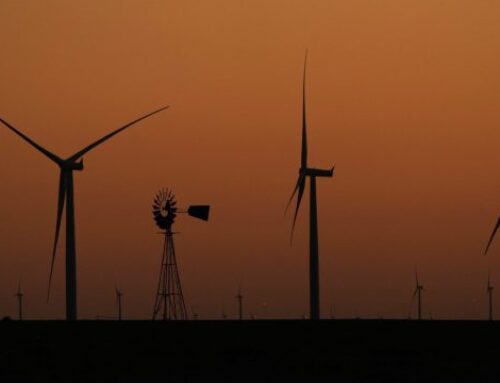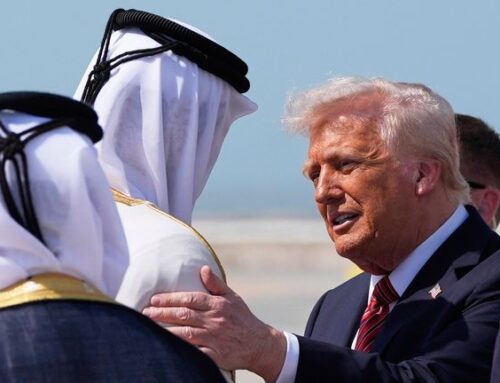Washington’s Energy U-Turn Is Good News for Africa
May 14, 2025
Washington’s Energy U-Turn Is Good News for Africa
After Trump administration pressure, the World Bank may make sweeping changes to global energy finance.

Amid the shock, condemnation, and derision that have met the Trump administration’s early steps on the international stage, a moment of rare cheer came during a speech by U.S. Energy Secretary Chris Wright at the Powering Africa Summit in Washington in March.
Interrupted by applause from African leaders, Wright said the Trump administration “has no desire to come and tell you what you should do with your energy system. … It’s a paternalistic, postcolonial attitude I just can’t stand.” More applause came when he told the summit that coal would remain the world’s largest source of electricity generation for decades. He ended his speech with a promise: “Climate change is a real thing, but to put it not only on par with human lives but superior to human lives … this administration will not do that.” Wright left the stage to a standing ovation.
Amid the shock, condemnation, and derision that have met the Trump administration’s early steps on the international stage, a moment of rare cheer came during a speech by U.S. Energy Secretary Chris Wright at the Powering Africa Summit in Washington in March.
Interrupted by applause from African leaders, Wright said the Trump administration “has no desire to come and tell you what you should do with your energy system. … It’s a paternalistic, postcolonial attitude I just can’t stand.” More applause came when he told the summit that coal would remain the world’s largest source of electricity generation for decades. He ended his speech with a promise: “Climate change is a real thing, but to put it not only on par with human lives but superior to human lives … this administration will not do that.” Wright left the stage to a standing ovation.
There is much to be skeptical about with the Trump administration’s energy agenda, from its rhetoric about U.S. energy dominance to its fierce hostility to renewable energy to its quixotic effort to revive the U.S. coal industry. But key members of the administration clearly understand some very important things about energy and climate change: first, that energy is the lifeblood of all modern economies, and second, that there is no just or even plausible path to addressing climate change that obstructs the development aspirations of poor countries.
The Biden administration, by contrast, was not always clear on these facts. Instead, it was often beholden to progressive environmental and development groups that actively deny them. At an African ministerial conference in Dakar, Senegal, in 2022, U.S. climate envoy John Kerry insisted that sub-Saharan Africa, which accounts for a negligible 0.6 percent of cumulative global emissions (excluding South Africa), must contribute to global emissions cuts of 45 percent by 2030, with the aim to limit global warming to 1.5 degrees above preindustrial levels. Kerry claimed that this diktat was being imposed on African nations not by rich countries but by “physics and mathematics.”
“The challenge of the climate crisis comes from the crisis of emissions in every country—the cars we drive, how we cook our food, heat and cool our homes,” Kerry told the leaders of some of the world’s poorest nations, where vanishingly few people even own cars or have access to modern cooking, heating, and air conditioning. These are all things that people in Kerry’s world take for granted. Even as African countries struggled to scale solar energy, the Biden administration’s clean energy advisor, John Podesta, talked up the importance of a global strategy focused on renewable energy, especially solar. In his view, financing was the main obstacle, but the COP process would solve that problem.
Nongovernmental organizations that say they are fighting poverty almost uniformly support Kerry’s demands. In 2023, Save the Children demanded a rapid phase-out of all fossil fuels in order to save poor children from extreme weather conditions. The group pointed to data that 27 million children had been forced into hunger by extreme weather that year, mostly in the Horn of Africa and southern Sahel. The irony that virtually none of the children in these places had access to fossil fuels was apparently lost on the charity. Rather than finance lifesaving modern infrastructure and amenities for these regions, even if they are powered by fossil fuels, Save the Children argued that the solution was to stop cooking with wood and charcoal and instead use biogas, using costly imported equipment to turn waste from food that these children don’t have into clean cooking fuel.
Oxfam, meanwhile, late last year demanded a “‘Trump-proof’ climate deal” that would prohibit export credit agencies from financing any fossil fuel infrastructure in order to protect the global poor “from damaging storms, heat waves, and rising seas.” Action Aid, another global poverty charity, demanded in 2023 that rich country governments not only end development finance for fossil fuel infrastructure and industrial agriculture in poor countries but also prevent the private sector from investing in these sectors.
All of these claims and demands, whether by the Biden administration or global charities, elide the reality that the global poor are most vulnerable to extreme weather and climate-related disasters precisely because they are poor—and not because climate change is particularly strongly implicated in these disasters.
It is one thing to argue that rich countries, safely insulated from the vagaries of climate and weather due to wealth, infrastructure, and abundant energy still consisting mainly of fossil fuels, need to rapidly transition away from these fuels to limit the impacts of future warming on the global poor. Historically, this argument was justified in significant part by a recognition that poor countries would still need to use greater amounts of fossil fuels for their development, where those continuing emissions would do the most good.
But, as Wright says, it is false to claim that rich countries must deny public and private finance to poor countries to prevent them from developing with fossil fuels. This demand is the equivalent of killing the village to save it because it effectively makes poor people more vulnerable to climate extremes to prevent them from emitting greenhouse gases that could make those extremes worse in the future. Yet this is precisely what the last U.S. administration, many European governments, green groups, and poverty charities have uniformly demanded in recent years.
Not surprisingly, African nations that have found themselves on the receiving end of these policies have long opposed them. In 2021, Nigerian Vice President Yemi Osinbajo pleaded with rich countries not to impose bans on financing fossil fuels. “After decades of profiting from oil and gas, a growing number of wealthy nations have banned or restricted public investment in fossil fuels, including natural gas,” he wrote in Foreign Affairs. “Curbing natural gas investments in Africa will do little to limit carbon emissions globally but much to hurt the continent’s economic prospects.” That same year, Uzodinma Iweala, then chief executive of the Africa Center, accused rich countries of energy redlining, recalling practices in the United States that prevented Black people from building wealth. “It’s particularly galling that the rich nations pushing policies that would block financing for fossil fuel-powered energy generation in poorer countries are actively building and funding similar projects on home soil,” he wrote in the Financial Times.
In response to the refusal of Western institutions to finance fossil fuel projects, a coalition of 18 oil-producing African countries announced in late 2024 that it was seeking at least $5 billion to create an energy bank dedicated to funding such initiatives. Coalition members argue that exploiting oil and gas resources is crucial for industrialization and addressing energy poverty on the continent. At the Offshore Technology Conference in Houston last week, Nigerian Minister of State for Petroleum Resources Heineken Lokpobiri announced that the African Export-Import Bank would invest $19 billion in the energy bank. Lokpobiri called for African nations to unite around the issue of energy poverty, emphasizing that the “hypocritical” global energy transition narrative “has put Africa at a disadvantage.”
Whatever else one thinks of it, the Trump administration appears, to its credit, determined to put an end to policies that restrict the development of Africa’s energy resources. These restrictions are, as Wright told African leaders, neocolonial. Under pressure from the Trump administration, the World Bank is now considering sweeping changes to its energy finance priorities, including an expansion of gas projects and the lifting of its bizarre ban on nuclear power finance that has been in place since 2013. (As always, zero-emitting nuclear power is the litmus test for those claiming to prioritize climate change rather than a much broader agenda of activist goals.)
The World Bank’s new tone should be music to the ears of anyone who cares about African development. “There is no reason why a country in Africa should not care about affordable, accessible electricity,” World Bank President Ajay Banga told reporters at a press briefing last month. “And it includes gas, geothermal, hydroelectric, solar, wind and nuclear where it makes sense.” This language represents a marked shift for an institution that had refused to finance anything other than wind and solar energy for more than a decade. Even as 600 million Africans had no access to electricity, the World Bank insisted that financing natural gas—abundantly available in Africa—was off the table, with few exceptions. Nor would it consider nuclear energy, despite growing interest from many African nations.
This shift will almost certainly raise predictable complaints from the climate movement, progressive Democrats, European governments, and even the World Bank’s own staff. But the reality is that even if sub-Saharan Africa were to triple energy consumption by its 1.2 billion people using only fossil fuels, the resulting increase in emissions would be a mere 1 percent of the current global total.
Allowing Africa to rapidly grow its energy consumption would not only improve living standards substantially. It would also ensure that Africans were vastly more resilient to climate extremes.
Moreover, a major acceleration in the pace of energy development in Africa would almost certainly be far less carbon-intensive than it was in nations that industrialized earlier, including the United States and China. That’s because Africa—while richly endowed with natural gas, uranium, hydroelectric, wind, and solar resources—has very little coal.
Amid all the ill effects that tariffs, the destruction of foreign aid, and other Trump administration policies may wreak upon the developing world, Washington’s 180-degree turn on energy finance for the developing world looks like good news for Africa.
This post is part of FP’s ongoing coverage of the Trump administration. Follow along here.
Ted Nordhaus is the co-founder and executive director of the Breakthrough Institute and a co-author of An Ecomodernist Manifesto. X: @TedNordhaus
Vijaya Ramachandran is the director of energy and development at the Breakthrough Institute. X: @vijramachandran
More from Foreign Policy
-
Indian Air Force personnel stand in front of a Rafale fighter jet during a military aviation exhibition at the Yelahanka Air Force Station in Bengaluru. A Tale of Four Fighter Jets
The aircraft India and Pakistan use to strike each other tell a story of key geopolitical shifts.
-
A cardinal in a black robe with red sash with hands folded in front of him walks past a stage and steps. Conclave Sends Message With American Pope
Some cardinals had been agitating for U.S. leadership to counter Trump.
-
An illustration shows red tape lines crossing over and entrapping a semiconductor chip. Is It Too Late to Slow China’s AI Development?
The U.S. has been trying to keep its technological lead through export restrictions, but China is closing the gap.
-
A man watches a news program about Chinese military drills surrounding Taiwan, on a giant screen outside a shopping mall in Beijing on Oct. 14, 2024. The Pentagon Fixates on War Over Taiwan
While U.S. military leaders fret about China, Trump has dismissed the Asia-Pacific.
Search
RECENT PRESS RELEASES
Related Post








